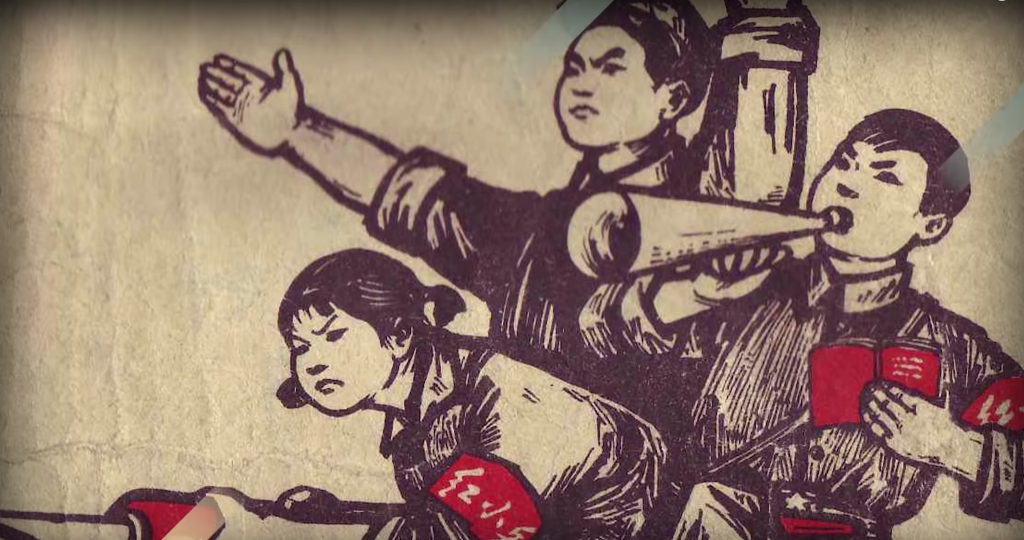Is that a cheer one hears from the East, or a throaty fight song? Increasingly, it sounds like a howling chorus of angry apparatchiks. They have their reasons.

As reported yesterday on Bloomberg in a piece titled, "Trade War Fight Song Shows Growing Anti-U.S. Sentiment in China," a number of anti-tariff measures and pro-patria propaganda have been set forth to fortify the spirit of the people:
Perhaps nothing captures the growing anti-U.S. sentiment in China better than a song about the trade war that is going viral in Beijing: “If the perpetrator wants to fight, we will beat him out of his wits...Trade war! Trade War! Not afraid of the outrageous challenge! Not afraid of the outrageous challenge!...State media [is] calling the trade dispute a “people’s war." Even seafood hasn’t escaped sharper rhetoric. Guangdong province’s Communist Party Youth League [is] calling for China to eat more tilapia -- a farmed fish now subject to higher U.S. tariffs. A commentary in the People’s Daily warned that attempts to...impede...rejuvenation of the Chinese nation would be like "a mantis trying to stop a car with its arms."...Starting Monday, Chinese radio and television stations will be required to play the country’s national anthem, “March of the Volunteers,” at 7 a.m. each morning...Other plans include...[teenage] summer camps that will lead them to “experience revolutionary feelings and inherit red genes.”
The message repeated to the people, and indeed to the world, is one of endurance. We have prepared ourselves physically and psychologically, say state media, to outlast our opponent. One might imply that this sounds a lot like "tighten your belts" to the masses. Beijing's anger, cloaked in upbeat nationalism, is based in shameful memories.
China is willing to suffer in order to emerge victorious, fueled in large part by the Century of Humiliation, beginning with the Treaty of Nanking (1839), which the Chinese would come to refer to as the first of the "unequal treaties," wherein the Qing Dynasty's ignorance of international law cost them dearly by way of tariffs, extraterritoriality, and most favored nation (MFN) status. These colonial wounds are still fresh--in a culture aged five millennia, 75 years is but a burp--and the chip on their national shoulder rides high.
As the trade war with China grinds on, more Americans are discovering Global Times, the more strident, English language version of the pure-party-line People's Daily. Boastful, hawkish, sinister, and translated with just enough imprecision to be humorous, the tone of the editorials, intentionally or not, is often Bond-villainesque. More to the point, Global Times says brusquely what People's Daily cannot. In so doing, it provides a unique window into the psychology and motivation of the State Council.
Let's parse a couple of articles.

"A decisive moment is needed to change people's perceptions. Once the world realizes [Huawei can't be thwarted,] everyone will know it is useless for the US to engage in a technical blockade and Chinese technology companies cannot be hindered."
Note the mixture of broad-based entreaty ("A decisive moment is needed"), flat-out absolutes ("the world...everyone will know"), to shoe-pounding declarations of insecurity masked as might ("useless for the US...cannot be hindered"). It might as well be Goldfinger or Blofeld shouting from a flooding cave or burning parapet.
Same article:
"For a long time, the US has held a certain contempt toward China." No mention of the tens of billions we spend on Chinese products.
"They seem to believe that it is impossible for the Chinese to master advanced technologies by themselves, unless they steal US technology to develop." That's not opinion so much as globally recognized fact. Chinese tech expertise grown recently, but it was built, and continues to be fed, by the fruits of outright theft.
"Under [US] logic, China achieved all its technological progress and development by stealing US technologies, which is why they spend lots of effort accusing China of stealing US intellectual property." Restating the argument doesn't make it any more true, despite what Goebbels or Alinsky have said.
Now watch this trick, and keep in mind, this is still from the same short article:
"In 2018, the US restricted exports of nuclear technologies to China...citing complaints that China was stealing US nuclear technology. In fact, despite the US restrictions, the two Chinese nuclear giants haven't seen much impact on their development, with various projects still advancing steadily. Now it is clear that there is no use in the US blocking China from accessing its nuclear technology."
So, the argument, paraphrased, proceeds thusly: "The US says we stole, so they restricted access to nuke tech. But hey, things haven't slowed much--trust us!--so that makes it clear they shouldn't bother with those silly restrictions."
This article illustrates some of the Nanking hangover:
"But it's impossible for the US to tear down the manufacturer that leads the 5G network." This sounds like something between an advertisement and a wish.
"Huawei will never allow itself to be trampled upon by the US government." Defiance, a clear colonial whistle. Of course "Huawei," or any other Chinese company name, is essentially a stand-in for China itself.
"The US, as the most powerful country in the world and a leader of the West, has spared no efforts in suppressing a private company but yielded little results." This sounds like flattery with a sour twist, but in fact points out the bully hegemon (the US instead of the UK this time), and states that this time, no one is fooled.
"First, that's because the US actions are immoral and against the logic of the market." While morality and Chinese trade aren't highly correlated in our minds, consider that they view the West as the original trade deceivers, so claiming this high ground is both natural and imperative.
"The US cannot strangle Huawei...and deprive the 1.4 billion Chinese people of their development rights." Dramatic imagery is abundant in the Global Times. The idea that the US, the largest importer, both gross and net, of Chinese product is depriving them of anything is ludicrous. The notion that Huawei will lift the vast majority of poor Chinese citizens into prosperity, or that such "development" is a right, is equally silly. This is an appeal to the masses of sorts, but good politics nonetheless.
In the Global Times, an undeniable pattern emerges, one that puts flesh on the otherwise inscrutable government facade. Leadership, from Xi Jinping down to community organizers, is focused and stalwart. The underlying message from Beijing: everyone involved--America, those holding Chinese equities and property, and definitely Chinese citizens--should be prepared to suffer for a long time. Only the lattermost are expected to smile about it all, for, as is implicitly promised, they will be remembered well when the glory of the empire is realized again.
Where have we heard that before?
Some rough parallels between Trump and Xi: China's drive to become the top superpower and vanquish memories of the Century of Humiliation is not unlike America First, or Make America Great Again--both are planned recoveries from perceived failures. The language Trump used with farmers--that they are patriots, that they should be willing to suffer in the short term for eventual gains--is very much the same as the China claiming that its people are prepared psychologically to endure the trade war. Finally, when you read the Global Times, just think of it as Xi's version of Trump's Twitter account.
Subscribe to our evening newsletter to stay informed during these challenging times!!